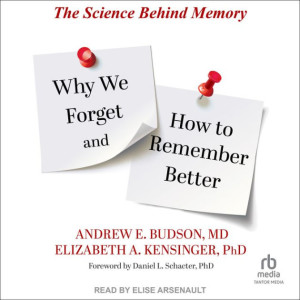 Why We Forget and How to Remember Better by Dr. Andrew E. Budson and Dr. Elizabeth A. Kensinger is a captivating research driven exploration of the intricate workings of human memory. In this comprehensive book, the authors delve into the latest scientific insights about memory, making this complex topic accessible and relevant to college students, teachers, and a valuable review and update for researchers.
Why We Forget and How to Remember Better by Dr. Andrew E. Budson and Dr. Elizabeth A. Kensinger is a captivating research driven exploration of the intricate workings of human memory. In this comprehensive book, the authors delve into the latest scientific insights about memory, making this complex topic accessible and relevant to college students, teachers, and a valuable review and update for researchers.
The book begins by addressing the fundamental questions that haunt our understanding of memory. Why do we forget? How can we be certain about our memories? Why do we struggle to recall names and important information when we need them the most? Through their extensive experience, Budson and Kensinger provide insightful answers and guide readers on a journey to understand and enhance their memory.
The book challenges common beliefs by revealing that memory’s primary function goes beyond recalling details from the past; it’s a complex web of abilities waiting to be explored. Also, many of us have heard the terms working memory, procedural memory, short term memory, muscle memory etc.; this book and its awesome illustrations help you clarify and differentiate these and other concepts.
As readers delve into the pages, they gain valuable insights into how memories are formed, stored, and retrieved during daily life. What’s more, the book equips readers with the power to take ownership and control of their memory abilities, offering strategies to remember what matters most and forget what’s less relevant. It goes further, offering practical tips for effective study techniques, a boon for students gearing up for exams. But that’s not all. “Why We Forget and How to Remember Better” doesn’t just stop at enhancing memory for practical tasks. It teaches readers how to remember names, passwords, and even lengthy information like 50 digit numbers, unlocking a world of superhuman enhanced memory skills. It really shows you how to make the most of what you got.
The book discusses the controversial and fascinating area of memory by exploring the fine line between true and false memories, providing readers with tools to navigate the terrain of memory accuracy with confidence. The narrative also delves into the ever-evolving nature of memory, highlighting how it develops in normal aging and various conditions such as Alzheimer’s disease, depression, anxiety, PTSD, ADHD, and the unique impact of COVID-related brain fog.
As the story unfolds, readers discover the intriguing interplay between external factors and memory. It explores how exercise, nutrition, psychedelics, alcohol, cannabis, sleep, mindfulness, and music can all influence the way we remember, emphasizing the vital connection between lifestyle choices and memory health. We get information helping us separate the myths and marketing hype from what has been supported by the science and where there are still questions and possibilities.
While to book uses technical language, the narrative and illustrations makes this language accessible. This is important because the oversimplification of many science-based books for the layperson can easily simplify to the point of generating new myths. But this book is very careful, and you will discover your own misconceptions or at least learn some useful support for dispelling myths of friends, students, and family.
Advice from the authors applies the concepts they teach throughout the book into the construction of the book as a learning resource. To assist readers in recalling the book’s key themes, the authors have applied principles from the science of learning. They’ve deliberately repeated important ideas at intervals and employed vivid metaphors to enhance retention. The information is offered in small meaningful chunks allowing you to read for 15 min learn something and take a break or explore the content in ways that make sense to you. It’s suggested that readers avoid reading the entire book in a single sitting for optimal memory retention. Instead, they should read a few chapters, reflect on the content, and return to it later, preferably after a night’s rest.
I really enjoyed the review and new insights this book offered me as a learning scientist and also learned some great metaphors and ways of presenting information to my students along the way. Most importantly, it’s easy to comprehend, enjoyable, and memorable. It challenges preconceptions, equips readers with practical tools, and offers a panoramic view of memory’s role in our lives. This narrative promises to be a captivating and valuable resource for those seeking to unlock the full potential of their memory and cognitive abilities.




Pingback: Phenomenological Studies: Exploring Lived Experiences in 2024-2025